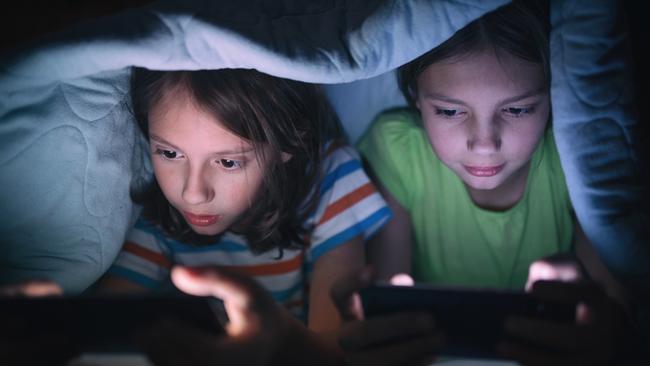Queensland kids spend more time on devices, with a warning for parents
Queensland kids are spending 50 per cent more time on their screens than they did in 2019, new research shows, but one of the most shocking findings is what parents admit their young children have been exposed to online.
Education
Don't miss out on the headlines from Education. Followed categories will be added to My News.
Almost half of all Queensland parents have admitted their kids are spending more time on screens than they did two years ago, a new research report has found.
Despite concerns over online safety and cyber bullying, the latest Real Family Concerns Report 2021 out today has revealed Queensland kids are spending 47 per cent more time each day on screens than they did in 2019.
Alarmingly, more than a third of Queensland families surveyed for the Real Insurance report also said their kids had encountered an “online threat”, such as being approached by a predator, seeing pornography, an online scam or having their privacy compromised.
The ongoing fallout of the Covid-19 pandemic was also noted as a major concern among parents with regards to family wellbeing.
Family psychologist Clare Rowe said the symptoms of stressed parents - such as fatigue, anxiety, and irritability - which had increased due to the pandemic could inadvertently impact on kids, with decreased “family engagement” a possible reason for the increase in screen time.

“In many ways, technology has been an enormous assistance during the recent lockdowns, enabling a continuation in some sorts of education, work and maintaining social relationships,” she said.
“However increased screen time has also been repeatedly linked to increases in mental health conditions such as depression and anxiety.
“Parents are consistently reporting concerns around their children’s screen habits that has seen an increase in social media activity and a decrease in family engagement.
“There is ... a concern about how to manage the expected decrease in screen time when lockdown restrictions ease and how families navigate a way back to face to face engagement.”
The report also found while financial stresses had eased slightly since early 2020, more than two-thirds were still concerned about day-to-day expenses, while more than 80 per cent were concerned about the ongoing rising cost of living.
Screen time is also negatively impacting on kids sleep, particularly for teens.
MyStrengths founder and teen counsellor Dan Hardie said the company’s most recent research had found screen time was the top activity for teens before bed, with more than two-thirds interacting with a screen in the hour before sleep.
But the top concern for Queensland parents with regards to screen time was online predators (65 per cent) followed by exposure to bullying (54 per cent) online scams (51 per cent) hacking (49 per cent) and internet addiction (48 per cent).
Almost all parents (85 per cent) said online safety should be part of their child’s school curriculum.
“These (online) threats are even more pertinent with younger children who lack the maturity, life experience and cognitive ability to fully understand and take these threats seriously,” Ms Rowe said.
“Schools can play a role in structured education around online use too but at the end of the day the best protection is parental involvement, talking to your child and monitoring their online usage.”


